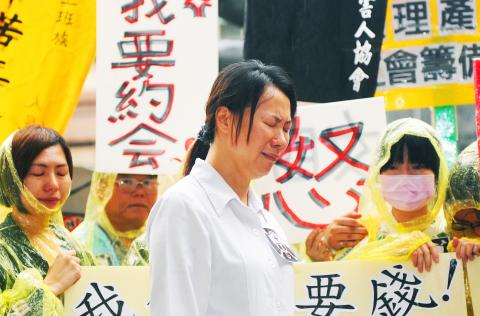A group of nurses protested outside the Council of Labor Affairs yesterday against harsh working conditions, demanding the abolition of an article in the Labor Standards Act (勞動基準法) that makes it possible to make medical staffers work long hours of overtime.
Wang Yun-hsu (王云緒), a member of the preparatory group for the Taiwan Radical Nurses Union, urged the government to abolish Article 84-1 of the act, which effectively makes long hours of overtime legal.
The article stipulates that, should employers in certain job categories reach agreement with their employees and report the agreement to the relevant supervisory agency, they would be considered exempt from the provisions of Articles 30, 32, 36, 37 and 49 under the act.

Photo: Lo Pei-der, Taipei Times
These articles regulate the maximum number of working hours, the minimum number of weekly days off and the maximum amount of overtime for employees. They also stipulate additional safety measures that should be provided to female workers who work from 10pm to 6am.
Wang called on supervisory agencies to enforce a 48-hour interval between each shift rotation, because most nurses have two or three types of shifts each week. He cited Article 34 of the act, which stipulates that work shifts should be rotated once a week and that employees must be given adequate rest time.
The nurses complained that they are sometimes told to work a night shift and start a morning shift at 7am the next day.
The nurses said long working hours have compromised their health, leading to a situation in which sick nurses are looking after patients.
As for a recently announced government funded overtime fund of NT$2 billion (US$67.8 million), which will also be used to hire more staff, the nurses said that if current working conditions continue, they might not live long enough to enjoy the money they make working overtime.
The nurses said they would join labor rights activists in a Labor Day anti-poverty demonstration on Tuesday in Taipei to demand immediate improvements to their working conditions.
Labor Conditions Department official Chen Hui-min (陳慧敏) said her department would work with the Department of Health and improve workplace checks to protect the rights of medical personnel.
The council last year reviewed Article 84-1, under which some employers practice the “system of job responsibility,” she said.
Under that system, employees are assigned tasks to complete regardless of how long the work takes to complete.
Officials decided that most medical personnel would be exempt from the system by March 30.
However, the exemption does not cover medical staffers that work in emergency rooms, delivery rooms, operating rooms, post-anesthesia recovery rooms, burn units, intensive care units and organ transplant groups who will not receive an exemption until 2014, Chen said.
To prevent the article from being abused in the medicare sector, Chen said the labor council had also drafted a guide for employers to follow. The guide stipulates that daily work hours should not exceed 10 hours, daily working hours plus overtime should not exceed 12 hours and there should be a minimum 12-hour interval between shifts.
The guide also says that working time should not exceed 168 hours over four weeks or 240 hours per full month. In addition, it requires at least one day off a week or two days off every two weeks for employees, she said.

An essay competition jointly organized by a local writing society and a publisher affiliated with the Chinese Communist Party (CCP) might have contravened the Act Governing Relations Between the People of the Taiwan Area and the Mainland Area (臺灣地區與大陸地區人民關係條例), the Mainland Affairs Council (MAC) said on Thursday. “In this case, the partner organization is clearly an agency under the CCP’s Fujian Provincial Committee,” MAC Deputy Minister and spokesperson Liang Wen-chieh (梁文傑) said at a news briefing in Taipei. “It also involves bringing Taiwanese students to China with all-expenses-paid arrangements to attend award ceremonies and camps,” Liang said. Those two “characteristics” are typically sufficient

A magnitude 5.9 earthquake that struck about 33km off the coast of Hualien City was the "main shock" in a series of quakes in the area, with aftershocks expected over the next three days, the Central Weather Administration (CWA) said yesterday. Prior to the magnitude 5.9 quake shaking most of Taiwan at 6:53pm yesterday, six other earthquakes stronger than a magnitude of 4, starting with a magnitude 5.5 quake at 6:09pm, occurred in the area. CWA Seismological Center Director Wu Chien-fu (吳健富) confirmed that the quakes were all part of the same series and that the magnitude 5.5 temblor was

The brilliant blue waters, thick foliage and bucolic atmosphere on this seemingly idyllic archipelago deep in the Pacific Ocean belie the key role it now plays in a titanic geopolitical struggle. Palau is again on the front line as China, and the US and its allies prepare their forces in an intensifying contest for control over the Asia-Pacific region. The democratic nation of just 17,000 people hosts US-controlled airstrips and soon-to-be-completed radar installations that the US military describes as “critical” to monitoring vast swathes of water and airspace. It is also a key piece of the second island chain, a string of

The Central Weather Administration has issued a heat alert for southeastern Taiwan, warning of temperatures as high as 36°C today, while alerting some coastal areas of strong winds later in the day. Kaohsiung’s Neimen District (內門) and Pingtung County’s Neipu Township (內埔) are under an orange heat alert, which warns of temperatures as high as 36°C for three consecutive days, the CWA said, citing southwest winds. The heat would also extend to Tainan’s Nansi (楠西) and Yujing (玉井) districts, as well as Pingtung’s Gaoshu (高樹), Yanpu (鹽埔) and Majia (瑪家) townships, it said, forecasting highs of up to 36°C in those areas